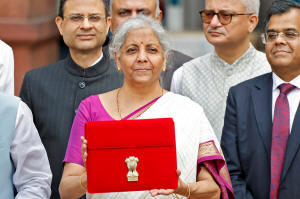India boosts spending on job creation, rural areas in first budget after
election
 Send a link to a friend
Send a link to a friend
 [July 23, 2024]
By Sarita Chaganti Singh and Nikunj Ohri [July 23, 2024]
By Sarita Chaganti Singh and Nikunj Ohri
NEW DELHI (Reuters) -India struck a balance between greater spending on
jobs and rural development while narrowing the fiscal deficit in its
2024-25 budget unveiled on Tuesday, after last month's election setback
for the government.
Analysts blamed distress in rural areas and a weak job market for a poor
poll showing that cost Prime Minister Narendra Modi's Bharatiya Janata
Party (BJP) its absolute majority, making it dependent on allies to form
a government.
The government will spend $24 billion on job-spurring efforts over the
next five years and $32 billion on rural development this year alone,
Finance Minister Nirmala Sitharaman said while presenting the budget to
parliament.
"The budget successfully engineered a fine balance between supporting
job creation and skilling, rural development and agriculture, along with
continued focus on infrastructure spending without compromising on
fiscal consolidation," said Sakshi Gupta, principal economist at HDFC
Bank.
Amid concerns of an overheating market, Sitharaman also raised taxes on
equity investments and equity derivative trading, while giving
lower-income consumers some tax relief.

The government plans to cut its fiscal deficit to 4.9% of gross domestic
product in 2024-25, below the 5.1% figure in February's interim budget.
It has reduced its gross market borrowing marginally to 14.01 trillion
rupees.
That comes as a large surplus of $25 billion from the central bank this
year has helped the government reduce the fiscal deficit while letting
it spend more.
The budget's employment-boosting measures include incentives for
companies, such as those in manufacturing, and programmes to improve
skills and hand out cheaper loans for higher education, Sitharaman
added.
Although India's official unemployment rate in urban areas is 6.7%,
private agency the Centre For Monitoring Indian Economy pegs it higher,
at 8.4%.
The government will also maintain spending on long-term infrastructure
projects at 11.11 trillion rupees, offering long-term loans of 1.5
trillion rupees to states to fund such expenditure.
Some of these loans will be linked to reform milestones in areas such as
land and labour, which Sitharaman said the government intended to push
in its third term.
[to top of second column]
|

India's Finance Minister Nirmala Sitharaman holds up a folder with
the Government of India's logo as she leaves her office to present
the union budget in the parliament in New Delhi, India, July 23,
2024. REUTERS/Altaf Hussain

In a concession to the government's allies, Sitharaman said it would
hasten loans from multilateral agencies for the eastern state of
Bihar and the southern state of Andhra Pradesh.
TAX ON EQUITIES
India raised to 20% from 15% the tax rate for equity investments
held for less than a year, while for those held for more than 12
months the rate rose to 12.5% from 10%.
The government also increased the tax on equity derivative
transactions that have drawn retail investors.
The tax changes are a short-term negative for the market, said
Trideep Bhattacharya, the chief investment officer of Edelweiss
Mutual Fund.
"The tax increase is marginal but will help bring in rationality on
options trading exuberance and will better investment behavior,"
said Bhattacharya, adding it would drive a push to longer-term
investing.
Indian shares and the rupee declined after the news, although
consumer stocks rose 2% to a record high.
The NSE Nifty 50 and S&P BSE Sensex benchmarks were down about 0.7%
each by 1:15 p.m., after earlier session losses of as much as 1.6%.
The rupee slipped to an all-time low of 83.7150 to the U.S. dollar
on concerns of foreign outflows.
Bond yields were flat on an expected reduction in the fiscal
deficit.
($1=83.6410 rupees)
(Additional reporting by Aftab Ahmed; Writing by Ira Dugal; Editing
by Clarence Fernandez)
[© 2024 Thomson Reuters. All rights
reserved.]This material
may not be published, broadcast, rewritten or redistributed.
Thompson Reuters is solely responsible for this content.
 |